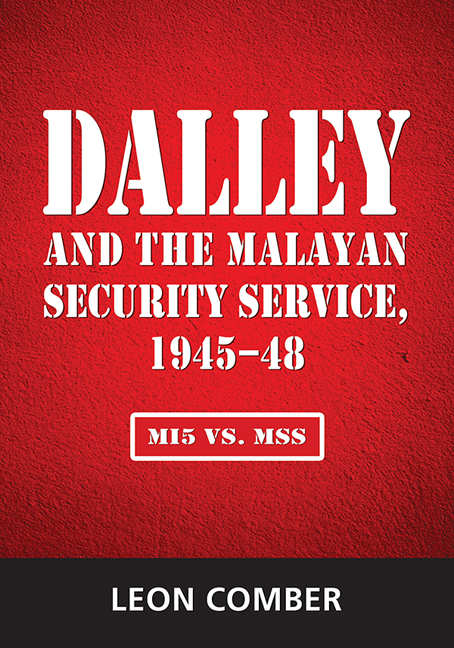Book contents
- Frontmatter
- Contents
- Preface
- Acknowledgements
- List of Abbreviations
- 1 Lieutenant Colonel John Dalley and the MSS: Early Days
- 2 Lieutenant Colonel John Dalley and Dalforce
- 3 The Establishment of “Security Intelligence Far East (SIFE)” in Singapore
- 4 Dalley's Return to Singapore
- 5 The Indonesian Situation and Malaya
- 6 Indonesian Encroachment into Malaya
- 7 Arrangements for Allocation of MSS Staff to Special Branch, Singapore, and Special Branch, Malaya
- 8 Conclusion
- Appendices
- Bibliography
- Index
- About the Author
7 - Arrangements for Allocation of MSS Staff to Special Branch, Singapore, and Special Branch, Malaya
Published online by Cambridge University Press: 12 February 2019
- Frontmatter
- Contents
- Preface
- Acknowledgements
- List of Abbreviations
- 1 Lieutenant Colonel John Dalley and the MSS: Early Days
- 2 Lieutenant Colonel John Dalley and Dalforce
- 3 The Establishment of “Security Intelligence Far East (SIFE)” in Singapore
- 4 Dalley's Return to Singapore
- 5 The Indonesian Situation and Malaya
- 6 Indonesian Encroachment into Malaya
- 7 Arrangements for Allocation of MSS Staff to Special Branch, Singapore, and Special Branch, Malaya
- 8 Conclusion
- Appendices
- Bibliography
- Index
- About the Author
Summary
The final details of the transfer of MSS officers and staff were decided at meetings held by the Commissioner of Police, Singapore, and the Colonial Secretary, Singapore, on 20 August 19481 and a meeting at the Singapore Special Branch on 25 August attended by A.J. Kellar, Head of SIFE; I.S. Wylie, Assistant Commissioner, Special Branch, Federation of Malaya; and N.G. Morris, Assistant Commissioner, Special Branch, Singapore, with E. Leighton, DSO (Defence Security Officer), Singapore and Federation of Malaya, in attendance.
It was agreed that the finances of the two Special Branches should be operated separately from 1 October 1948, and on that date the balance of the MSS funds would become available to the Singapore and Federation of Malaya Governments, respectively.
It was proposed that Woolnough, then based in Johor, should head the Malay and Indonesian Section, as shown above. The Assistant Commissioner would be made in charge of administration and be responsible for the collection and collation of all political information affecting the security of Singapore. He would also be expected to maintain close contact with other intelligence organizations in Malaya and neighbouring countries.
The Superintendent would be employed mainly on Communist organizations and would coordinate and direct the activities of all sub-branches. In connection with Communist activities, he was required to pay frequent visits to the Federation of Malaya and contact officers there whom he might wish to consult.
The General, Foreign and E & O Section would be employed on general enquiries, including affairs of Europeans, Eurasians, Siamese and foreign nationals not mentioned above, counterespionage, security of information in Singapore and surveillance.
Interrogations connected with the “Emergency Regulations” (which were introduced after the outbreak of the Malayan Emergency) would be carried out by F.G. Minns, ASP, “but as he is already on the Singapore CID staff, there is no extra expense involved in this post”.
In addition to J.E. Fairbairn, who held the rank of Local Security Officer, MSS, but was not a member of the Police Force, there was, too, J.H. Ellen, who was a direct appointment to the MSS and was not a member of the Police Force.
- Type
- Chapter
- Information
- Dalley and the Malayan Security Service, 1945–48 , pp. 99 - 103Publisher: ISEAS–Yusof Ishak InstitutePrint publication year: 2018

